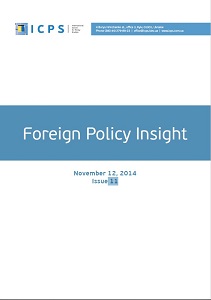
Foreign Policy Insight, Issue 2015 - Special Issue (March 18)
Turkey: a friend, a partner, a competitor?
More...We kindly inform you that, as long as the subject affiliation of our 300.000+ articles is in progress, you might get unsufficient or no results on your third level or second level search. In this case, please broaden your search criteria.

Turkey: a friend, a partner, a competitor?
More...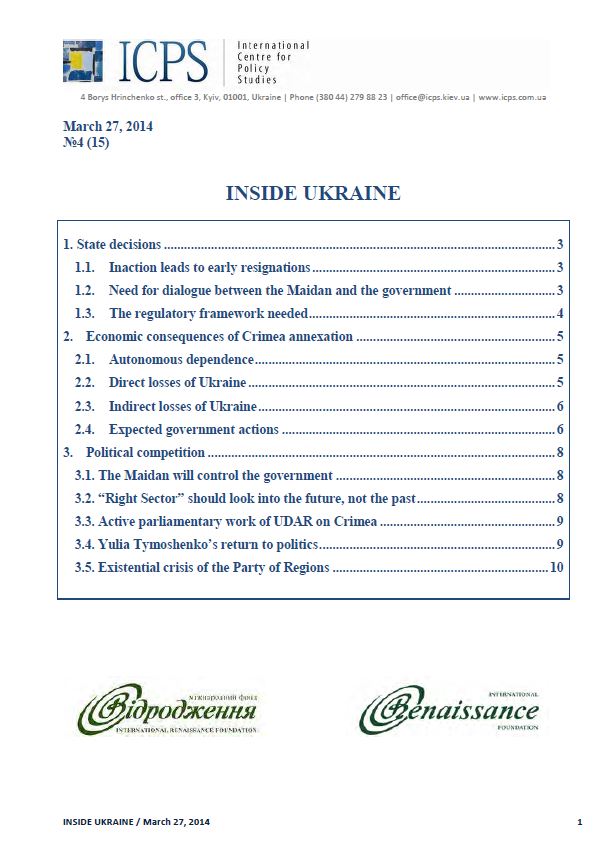
1. State decisions // 1.1. Inaction leads to early resignations // 1.2. Need for dialogue between the Maidan and the government // 1.3. The regulatory framework needed // 2. Economic consequences of Crimea annexation // 2.1. Autonomous dependence // 2.2. Direct losses of Ukraine // 2.3. Indirect losses of Ukraine // 2.4. Expected government actions // 3. Political competition // 3.1. The Maidan will control the government // 3.2. “Right Sector” should look into the future, not the past // 3.3. Active parliamentary work of UDAR on Crimea // 3.4. Yulia Tymoshenko’s return to politics // 3.5. Existential crisis of the Party of Regions
More...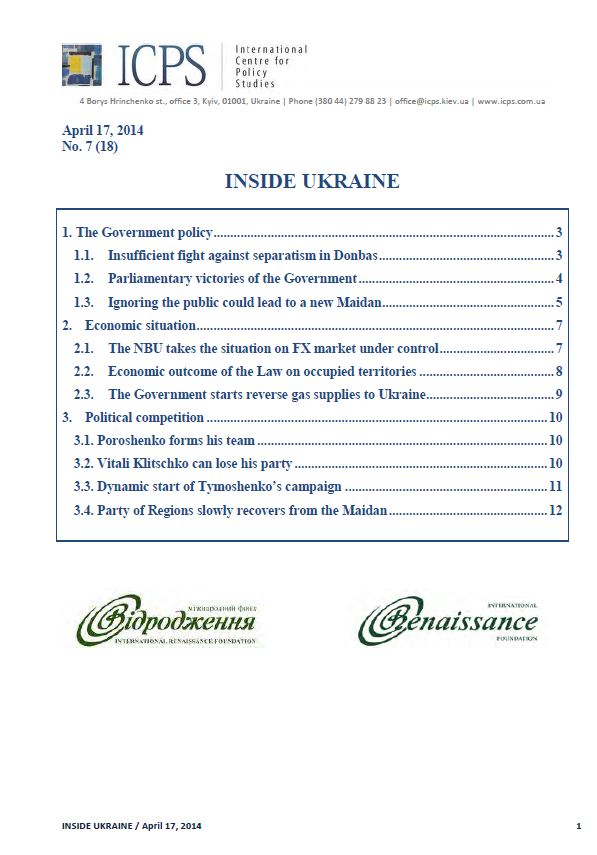
1. The Government policy // 1.1. Insufficient fight against separatism in Donbas // 1.2. Parliamentary victories of the Government // 1.3. Ignoring the public could lead to a new Maidan // 2. Economic situation // 2.1. The NBU takes the situation on FX market under control // 2.2. Economic outcome of the Law on occupied territories // 2.3. The Government starts reverse gas supplies to Ukraine // 3. Political competition // 3.1. Poroshenko forms his team // 3.2. Vitali Klitschko can lose his party // 3.3. Dynamic start of Tymoshenko’s campaign // 3.4. Party of Regions slowly recovers from the Maidan
More...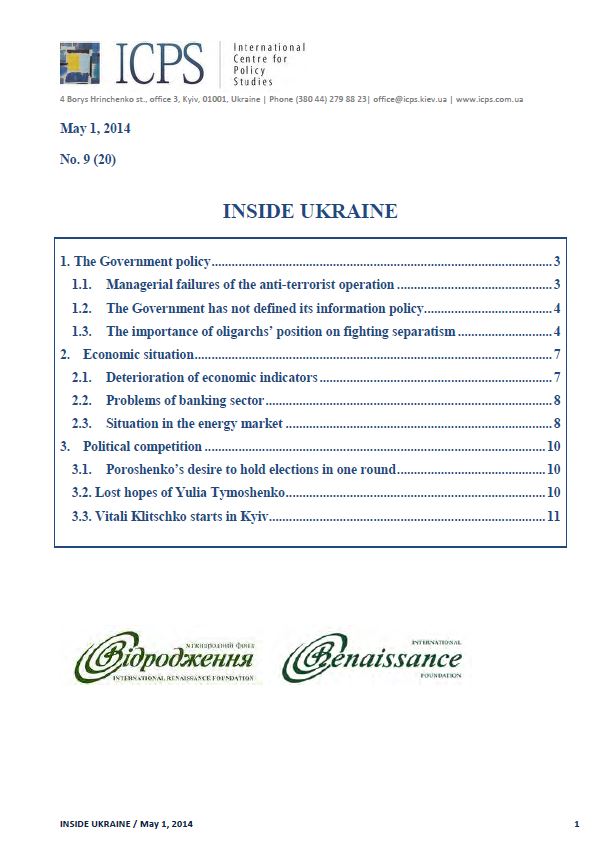
1. The Government policy // 1.1. Managerial failures of the anti-terrorist operation // 1.2. The Government has not defined its information policy // 1.3. The importance of oligarchs’ position on fighting separatism // 2. Economic situation // 2.1. Deterioration of economic indicators // 2.2. Problems of banking sector // 2.3. Situation in the energy market // 3. Political competition // 3.1. Poroshenko’s desire to hold elections in one round // 3.2. Lost hopes of Yulia Tymoshenko // 3.3. Vitali Klitschko starts in Kyiv
More...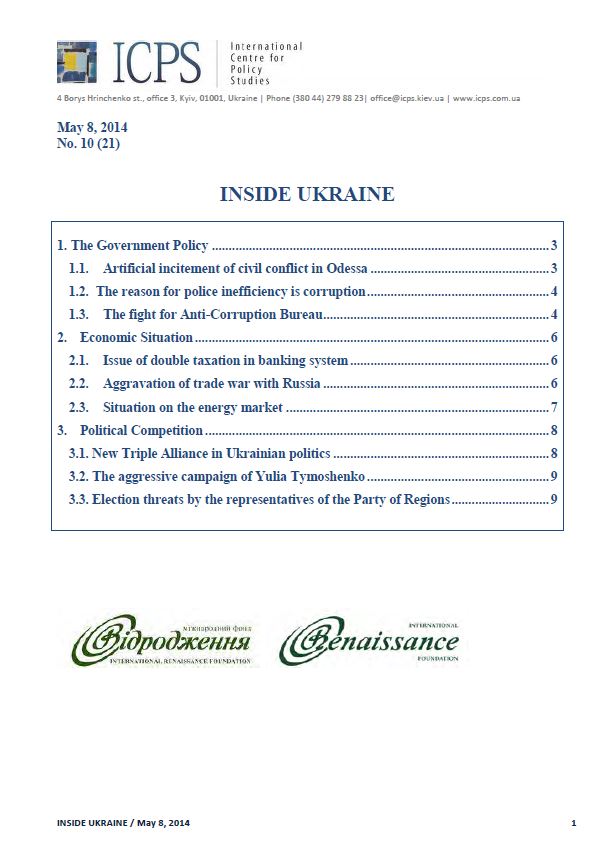
1. The Government Policy // 1.1. Artificial incitement of civil conflict in Odessa // 1.2. The reason for police inefficiency is corruption // 1.3. The fight for Anti-Corruption Bureau // 2. Economic Situation / 2.1. Issue of double taxation in banking system // 2.2. Aggravation of trade war with Russia // 2.3. Situation on the energy market // 3. Political Competition // 3.1. New Triple Alliance in Ukrainian politics // 3.2. The aggressive campaign of Yulia Tymoshenko // 3.3. Election threats by the representatives of the Party of Regions
More...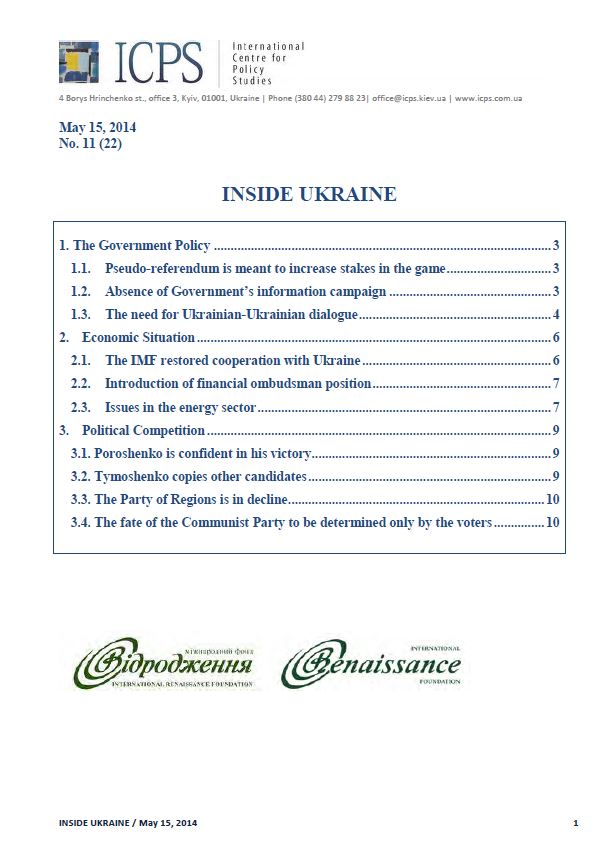
1. The Government Policy // 1.1. Pseudo-referendum is meant to increase stakes in the game // 1.2. Absence of Government’s information campaign // 1.3. The need for Ukrainian-Ukrainian dialogue // 2. Economic Situation // 2.1. The IMF restored cooperation with Ukraine // 2.2. Introduction of financial ombudsman position // 2.3. Issues in the energy sector // 3. Political Competition // 3.1. Poroshenko is confident in his victory // 3.2. Tymoshenko copies other candidates // 3.3. The Party of Regions is in decline // 3.4. The fate of the Communist Party to be determined only by the voters
More...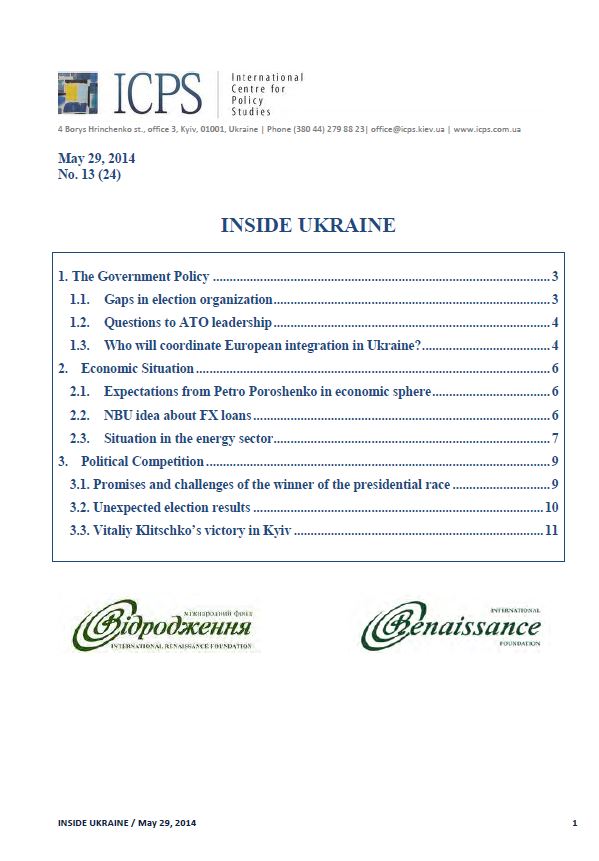
1. The Government Policy // 1.1. Gaps in election organization // 1.2. Questions to ATO leadership // 1.3. Who will coordinate European integration in Ukraine? // 2. Economic Situation // 2.1. Expectations from Petro Poroshenko in economic sphere // 2.2. NBU idea about FX loans // 2.3. Situation in the energy sector // 3. Political Competition // 3.1. Promises and challenges of the winner of the presidential race // 3.2. Unexpected election results // 3.3. Vitaliy Klitschko’s victory in Kyiv
More...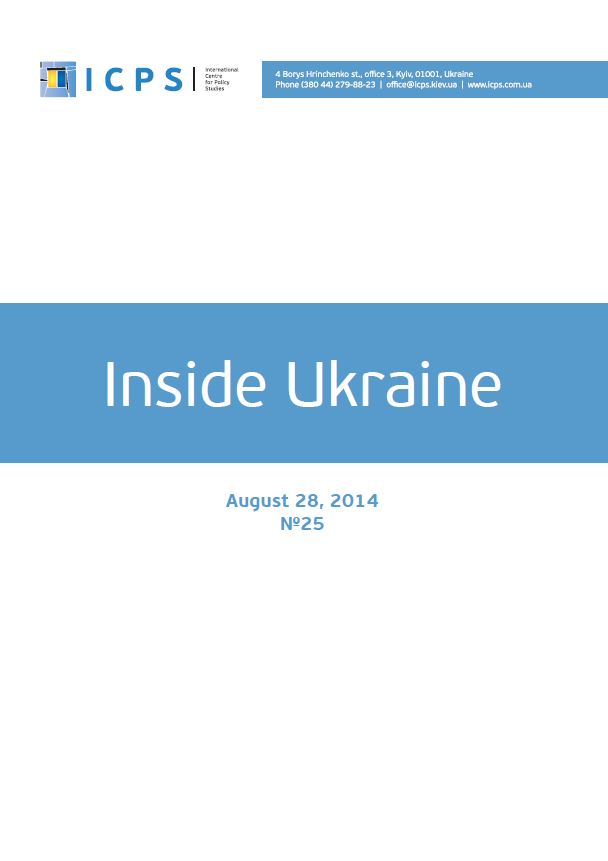
The Government Policy // Separatists’ actions are aimed at weakening the position of Ukraine in negotiations // «Currency unrest» as a result of the NBU inaction // Economic Situation // Government elaborated deregulation reform // Government proposes establishing Financial Investigations Service // Political competition // President’s initiative to decide on the coalition design before the elections // «Batkivshchyna» started its electoral campaign
More...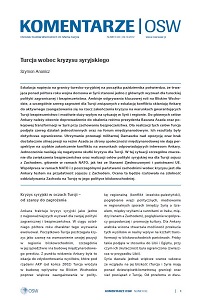
Jednym z najbardziej kontrowersyjnych punktów programu utworzonego w maju br. rządu w Izraelu jest zapowiedź decyzji w sprawie anektowania zajmowanych przez osiedla żydowskie części okupowanego terytorium Zachodniego Brzegu Jordanu. Ten dyskusyjny – zarówno w samym Izraelu, jak i w świecie – punkt znalazł się w umowie koalicyjnej ośmiu partii (reprezentujących szerokie spektrum polityczne), w wyniku której po trwającym półtora roku kryzysie politycznym powołany został rząd z Binjaminem Netanjahu na czele. Katalizatorem procesu uruchomionego w Izraelu oraz czynnikiem, który decyduje o jego wadze, jest opracowany przez administrację prezydenta USA Donalda Trumpa (we współpracy ze stroną izraelską) i ogłoszony 28 stycznia br. plan pokojowego uregulowania konfliktu izraelsko-palestyńskiego (Peace to Prosperity. A Vision to Improve the Lives of the Palestinian and Israeli People1 – dalej: Plan), m.in. postulujący aneksję przez Izrael części Zachodniego Brzegu. Na obecnym etapie – wobec licznych sporów w samym Izraelu, malejącego zainteresowania strony amerykańskiej sprawą oraz znaczących protestów społeczności międzynarodowej – trudno przesądzać zakres, tempo i charakter ewentualnej aneksji. Podjęcie tematu zapowiada jednak, że może dojść do poważnych przewartościowań w konflikcie izraelsko-palestyńskim, w regionie oraz relacjach Izraela ze światem zewnętrznym.
More...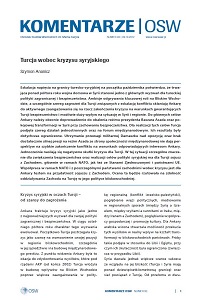
Po aneksji Krymu przez Federację Rosyjską w 2014 r. Tatarzy Krymscy zostali zmuszeni do przyjęcia strategii nastawionej na przetrwanie, uniknięcie represji oraz ewentualność kolejnego wysiedlenia, którego się poważnie obawiali. Część elit krymskotatarskich opuściła półwysep, zaś Medżlis – ich główny organ przedstawicielski – musiał przenieść się do Kijowa. Rosji zależało przede wszystkim na utrzymaniu spokoju na anektowanym terytorium. Kreml przyznał Tatarom Krymskim ograniczone koncesje, których przed 2014 r. nie był skłonny udzielić rząd podporządkowanej Kijowowi Autonomicznej Republiki Krymu, a zarazem zastosował dotkliwe represje wobec krymskotatarskich aktywistów. Tatarzy są wspólnotą traktowaną przez administrację okupacyjną podejrzliwie i konsekwentnie zastraszaną za pomocą brutalnych, choć punktowych, działań organów siłowych. Celem Moskwy jest zduszenie wszelkich przejawów oporu tej społeczności i uczynienie z niej mniejszości posłusznej władzom rosyjskim.
More...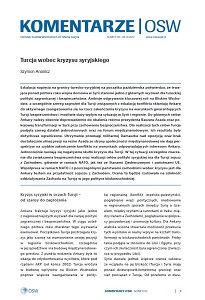
Pierwsza od 2014 r. poważna eskalacja konfliktu między rządzącym Strefą Gazy Hamasem a Izraelem zakończyła się 21 maja wynegocjowanym przez Egipt zawieszeniem broni. Konfrontację zbrojną rozpoczął Hamas po tym, jak władze w Jerozolimie zignorowały postawione przez tę organizację ultimatum zapowiadające atak, jeśli Izrael nie wycofa policji ze Wzgórza Świątynnego/kompleksu meczetu Al-Aksa oraz dzielnicy Asz-Szajch Dżarrah we Wschodniej Jerozolimie. W obu miejscach w ciągu kwietnia i maja narastały napięcia i dochodziło do starć między Palestyńczykami, izraelską policją oraz żydowskimi nacjonalistami. Po zakończeniu walk nastąpiła intensyfikacja międzynarodowych wysiłków dyplomatycznych na rzecz wypracowania trwałego rozejmu. W tym celu w dniach 24–27 maja przebywał w regionie sekretarz stanu USA Antony Blinken. Eskalacja przyciągnęła uwagę światowej opinii publicznej i doraźnie zmobilizowała do aktywności głównych aktorów międzynarodowych (regionalnych i globalnych). Nie wydaje się jednak, żeby w wyniku tych działań mogło dojść do zasadniczej zmiany któregokolwiek z głównych parametrów konfliktu izraelsko-palestyńskiego, a tym bardziej do powrotu do negocjacji pokojowych. Taki scenariusz wymagałby radykalnych przełomów politycznych zarówno po stronie izraelskiej (nie wydaje się, żeby mógł nim być właśnie utworzony rząd), jak i palestyńskiej oraz determinacji społeczności międzynarodowej, a przede wszystkim USA. Wystąpienie któregokolwiek z tych czynników jest obecnie mało prawdopodobne.
More...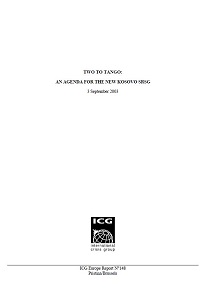
This report outlines several critical issues that the government and UNMIK will have to address together. It also provides recommendations on how the two sides can put their relationship back on track. The fates of UNMIK and the PISG are intertwined. To safeguard its credibility and ensure its role in future peacekeeping missions, the UN needs its engagement in Kosovo to be a success. The PISG needs to safeguard continued international support and its path towards European integration. Yet neither side appears to recognise their shared destiny. Given the challenges ahead, this must change.
More...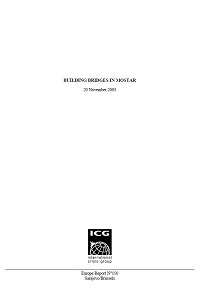
This report points out the crucial issues that must be settled in the current round of talks if Mostar is to be made whole. It provides a brief sketch of previous attempts to unite the city; discusses the major problems arising from its continuing fragmentation; seeks to offer an explanation of why Mostar has emerged once more as a problem requiring an urgent solution; and introduces the various proposals currently being canvassed in political and intellectual circles. Its concluding section outlines the rudiments of an organisational solution, involving changes to the electoral system for the Mostar council and a reform of the legal concept of the city in Bosnia and Herzegovina. This has the potential to ensure that Mostar can be reborn – both as a functional unit of self-government and as a multinational community in which all citizens feel themselves to be fairly represented.
More...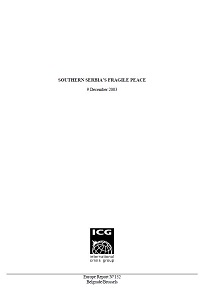
The Albanian-majority Presevo Valley in southern Serbia is one of the few conflict resolution success stories in the former Yugoslavia. Yet tensions linger, and a series of violent incidents in August and September 2003 demonstrated that the peace can still unravel. Serbia’s stalled reform process is preventing the political and economic changes that are needed to move forward on many critical issues in the area, and there is a general sense among local Albanians that peace has not delivered what it promised: an end to tensions with Serb security forces and prosperity. The incomplete peace in southern Serbia is further weakened by the continuing uncertainty over Kosovo’s final status. The international community will need to remain engaged, pressing both Belgrade and Albanian politicians to fulfil all aspects of the Konculj Agreement, while focusing more attention on economic development. The UN mission in Kosovo (UNMIK), the NATO troops there (KFOR) – particularly the U.S. contingent – and the Serbian government all need to reassess their performance.
More...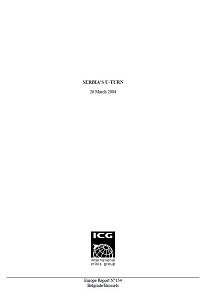
In politics and policies, Serbia increasingly resembles the Milosevic-era without Milosevic. Its reaction to the catastrophic mid-March 2004 near collapse of the UN mission in Kosovo (UNMIK), the strong showing by ultra-nationalists in the 28 December 2003 parliamentary elections and the subsequent two-months of squabbling before democratic parties could form a minority government that depends for survival on the support of Milosevic's old party all are signs that more trouble lies ahead. In 2004 Serbia can anticipate continued political instability, increasingly strained relations with the West and further economic decline. The spasm of ethnic cleansing of Serbs by Albanians in Kosovo has raised the prospect of Kosovo partition, strengthened the nationalist right wing and increased anti-Western sentiment. Instability and economic weakness could hasten moves by Montenegro towards independence, while Kosovo tensions could spill over into the Presevo valley, Sandzak and even Vojvodina.
More...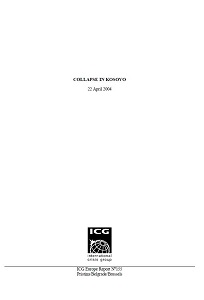
On 17 March 2004, the unstable foundations of four and a half years of gradual progress in Kosovo buckled and gave way. Within hours the province was immersed in anti-Serb and anti-UN rioting and had regressed to levels of violence not seen since 1999. By 18 March the violence mutated into the ethnic cleansing of entire minority villages and neighbourhoods. The mobs of Albanian youths, extremists and criminals exposed the UN Mission in Kosovo (UNMIK) and the NATO-led peacekeeping force (KFOR) as very weak. Kosovo's provisional institutions of self-government (PISG), media and civil society afforded the rioters licence for mayhem. The international community urgently needs new policies -- on final status and socio-economic development alike -- or Kosovo instability may infect the entire region. The violent explosion revealed Kosovo Albanian society to be deeply troubled, lacking institutions, leadership and the culture to absorb shocks and contain its violent, criminal minority.
More...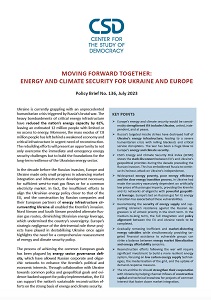
Russia’s invasion in Ukraine has led to a heavy humanitarian crisis on the European continent. Targeted missile strikes have destroyed half of the country’s energy infrastructure, causing rolling blackouts and critical service disruptions in the region. The war has also been the biggest test to Europe’s energy and climate security, following more than a decade of excessive dependence on Russian fossil fuel imports. Guaranteeing the security of energy supply and supporting Ukraine’s resistance against the Russian aggression is of utmost priority for Europe in the short term. In the medium-to-long term, the full integration and policy alignment between the EU and Ukraine needs to be completed as a foundation for the country’s sustainable economic development. This policy brief provides an overview of the evolution of energy and climate security risks in Ukraine before and after the Russian invasion, stepping on the results from CSD’s Energy and Climate Security Risk Index. It discusses how the Kremlin exploited critical governance gaps in Ukraine and the EU’s energy sector to weaken Ukraine’s capacity for resistance and Europe’s solidarity and unity in the face of war. It further offers insights and ideas about the most pressing policy priorities in view of Ukraine’s future reconstruction.
More...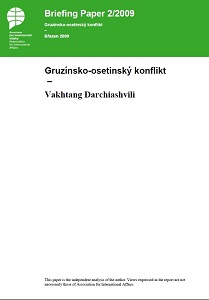
The Caucasus has always been a place of pervasive diversity. Although the diversity of the Caucasian nature creates a beautiful symbiosis, the ethnic and religious diversity in this part of the world from time to time creates considerable difficulties. As reality shows, these difficulties in connection with power interests can turn into a bloody war. There are plenty of such examples in the Caucasus in recent history (the conflict in Nagorno-Karabakh, the conflict in South Ossetia, the conflict in Abkhazia and, of course, the conflict in Chechnya). Until August last year, the least known of them was the one in South Ossetia.
More...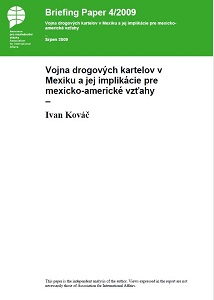
Mexico is practically the most important transit country for drug production from all of South America, taking into account its strategically important geographical location as a neighbor of the USA. According to data from the US Department of State, up to 90% of cocaine enters the US through Mexico. Today's powerful and highly organized smuggling groups are successors in the long smuggling history of the Mexican cartels. During the long period of one-party rule in Mexico (the PRI government; 1929-2000), the authorities tried to keep the negative effects, mainly violence, to a minimum, also by using quiet "drug trafficking management". In practice, this meant that central and regional governments often turned a blind eye to these crimes, either for profit or to maintain the peace. The result of the government's passive policy towards the cartels was mutual tolerance based on the principle of non-interference. Until the first half of the 90s, armed conflicts between competing drug organizations were only sporadic.
More...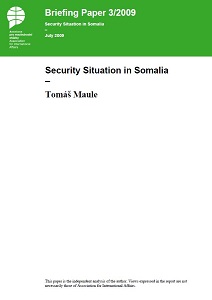
Somalia, a failed state since 1991 is facing a further deterioration of security and humanitarian situation. According to many Somalia has just entered the worst period since 1991. People are fleeing in large numbers not only due to intense fighting but often due to lack of food and water. 120 000 people were displaced in last month alone. The Djibouti Process (signed June 9, 2008) to which international community put much hope does not seem to be delivering. The Transitional Federal Government (TFG) is not any stronger then it was a year ago. The creation of a wider coalition was supposed to generate momentum for successful conquest of the Somali territory.
More...